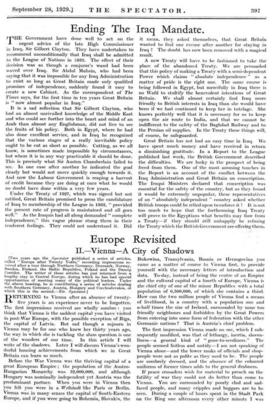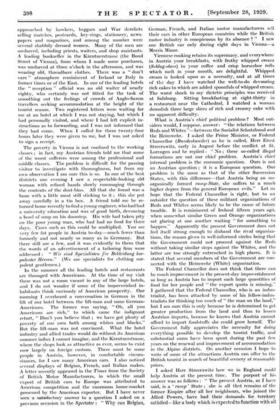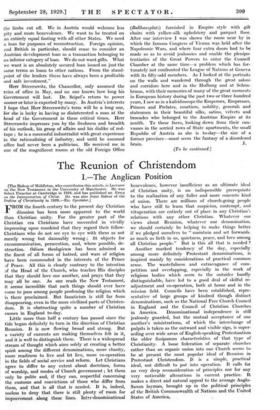Europe Revisited
II.—Vienna—A City of Shadows
[Two years ago the Spectator published a series of articles, called " Europe after Twenty Years," recording impressions re- ceived after a tour through Northern Germany, Denmark, Norway, Sweden, Finland, the Baltic Republics, Poland and the Danzig Corridor. The writer of these articles has just returned from a lengthy stay in Central Europe, during which he has had special opportunities of meeting many of the political leaders. Under the above heading, he is contributing a series of articles dealing with Southern Germany, Austria, Hungary and Czechoslovakia, of which this is the second.—En. Spectator.] RETURNING to Vienna after an absence of twenty- five years is an experience never to be forgotten. The first impreisions received are wholly sombre : you think that Vienna is the saddest capital you have visited in post-War Europe, with the possible exception of Riga, the capital of Latvia. But sad though a sojourn in Vienna may be for one who knew her thirty year's ago, the way in which she is tackling the slum question is one of the wonders of our time. In this article I will write of the shadows. Later I will discuss Vienna's won- derful housing achievements from which we in Great Britain can learn so much.
Before the War Vienna was the thriving capital of a great European Empire ; the population of the Austro- Hungarian Monarchy was 52,000,000, and although Hungary was nominally independent yet Austria was the predominant partner. When you were in Vienna then you felt you were in a`Weltstailt like Paris or Berlin. -Vienna was in many senses the capital of South-Eastern Europe, and if you Were-going to-Bohemia, SIoVakia, the Bukowina, Transylvania, Bosnia or Herzogovina you came as a matter of course to Vienna first, to provide yourself with the necessary letters of introduction and data. To-day, instead of being the centre of an Empire and the cultural capital of a fourth of Europe, Vienna is the chief city of one of the minor Republics with a total population of 6,500,000, of which she contains a third. How can the two million people of Vienna find a means of livelihood, in a country with a population one and a-half times the size of Ireland, surrounded by none too friendly neighbours and forbidden by the Great Powers from entering into some form of federation with the other Germanic nations ? That is Austria's chief problem.
The first impression Vienna made on me, which I sub- sequently modified, was that of lethargy, inertia, sloven- liness—a general kind of " gone-to-seediness." The people seemed listless and untidy—I am not speaking of Vienna alone—and the lower ranks of officials and shop- people were not as polite as they used to be. The people are sombrely dressed, and the absence of the coloured uniforms of former times adds to the general drabness.
If peace crusaders wish for material to preach on the futility of war they could not do better than come to Vienna. You are surrounded by poorly clad and sad- faced people, and many cripples and beggars are to be 'seen. During a couple of hours spent in the Stadt Park -On the" Ring one afternoon every 'other minute I was approached by hawkers, beggars and War derelicts selling matches, postcards, key-rings, stationery, news- papers and magazines, and among the number were several shabbily dressed women. Many of the men are unshaved, including priests, waiters, and shop assistants. A leading bookseller in the Kiirntnerstrasse (the Bond Street of Vienna), from whom I made some purchases, was unshaved at three o'clock in the afternoon, and was wearing old, threadbare clothes. There was a " don't care " atmosphere reminiscent of Ireland or Italy in former times or of the East. In one of the leading hotels the " reception " official was an old waiter of nearly eighty, who certainly was not fitted for the task of smoothing out the feelings of crowds of Anglo-Saxon travellers seeking accommodation at the height of the tourist season. Two registered letters were waiting for me at an hotel at which I was not staying, but which I had personally visited, and where I had left explicit in- structions as to forwarding, and I was not informed that they had come. When I called for them twenty-four hours later they were given to me, but I was not asked to sign a receipt.
The poverty in Vienna is not confined to the working classes ; in fact, my Austrian friends told me that some of the worst sufferers were among the professional and middle classes. The problem is difficult for the passing visitor to investigate with thoroughness, but from my own observation I am sure this is so. In one of the- best districts one evening I saw a respectable-looking old woman with refined hands slowly rummaging through the contents of the dust-bins. All that she found was a bone with a little meat still sticking to it ; this she put away carefully in a tin box. A friend told me he re- turned home recently to find a young engineer, who had had a University education and was of good birth, devouring a bowl of soup on his doorstep. His wife had taken pity on the poor young man, who had had no food for three days.. Cases such as this could be multiplied. You see very few fat people in Austria to-day--much fewer than formerly and not nearly so many as in Germany. But there still are a few, and it was evidently to them that the words of an advertisement of a tailoring firm were addressed : " Wir sind Spezialisten far Bekleidung kor- pulenter Herren." (We are specialists for clothing cor- pulent gentlemen.) In the summer all the leading hotels and restaurants are thronged with Americans. At the time of my visit there was not a room vacant in any of the large hotels, and I do not wonder if some of the impoverished in- habitants think enviously of American prosperity. One morning I overheard a conversation in German in the lift of our hotel between the lift-man and some German- Americans. The former was saying, " Oh, all you Americans are " rich," to which came the indignant retort, " Don't you believe that ; we have got plenty of poverty- of our .own both among whites and blacks." But. the lift-man. was not convinced. What the hotel industry and allied trades would do without its American summer influx I cannot imagine, and the Karntnerstrasse, where the shops look as attractive as ever, seems to exist now largely on foreign custom. There must be some people in Austria, however, in comfortable circum- stances, for I saw many American cars. I also noticed several displays of Belgian, French, and Italian makes. A letter recently appeared in the Times from the Society of British Motor Manufacturers, in which -the small export of British cars to Europe was attributed -to American competition and the enormous home-market possessed by the American exporter. But I have never seen -a -satisfactory answer to a question I asked on a previous occasion in the Spectator " Why can Belgian, German, French, and Italian motor manufacturers sell their cars in other European countries while the British motor industry is conspicuous by its absence ? " I saw one British car only during eight days in Vienna—a Morris Minor. • Viennese cooking retains its supremacy, and everywhere in Austria your breakfasts, with frothy whipped cream (Sehlog-obers) in your coffee and crisp horseshoe rolls which melt in your mouth, are delightful. • Whipped; cream is looked upon as a necessity, and at all times of the day I have watched the well-to-do devouring rich cakes to which are added spoonfuls of whipped cream. The worst shock to my dietetic principles was received at Salzburg. Sitting breakfasting at eight-thirty- in a restaurant near the Cathedral; I watched a woman demolish three large slices of rich and creamy cake with no apparent difficulty.
What is Austria's chief political problem ? Most- out- siders would, I suppose, answer : " the relations between. Reds and Whites "—between the Socialist Schutzbund and the Heimwehr. I asked the Prime Minister, or Federal Chancellor (Bundeskanzler) as he is called, Herr Ernst Streeruwitz, early in August before the conflict at St. Lorengen and he replied : " No ; these so-called illegal formations are not our chief problem. Austria's chief internal problem is the economic question. Ours is not an Austrian question ; it is a European question. Our problem is the same as that of the other Succession States, with this difference—that Austria being an un- organically formed rump-State, she suffers to a much higher degree from the general European evils."_ - Let us. hope that the Federal Chancellor is right; but to an outsider the question of these militant organizations of Reds and Whites seems likely to be the cause of future trouble. It is reminiscent of Ireland fifteen years aio, when somewhat similar Green and Orange organizations sat glaring at one another . waiting " for something to happen." Apparently the present Government does not feel itself strong enough to disband the rival organiza- tions, the reason given in well-informed circles being that the Government could nob proceed against the RedS without taking similar steps against the Whites, and the latter are too strongly entrenched in high places. It is stated that several members of the Government are con- nected with the Heimwehr (White) organization..
The Federal Chancellor does not think that there can be much improvement in the present-day impoverishment so long as Austria has to import such large quantities of food for her people and " the export quota is missing.". I gathered that the Federal Chancellor, who is an indus- trialist, has been attacked by some of his fellow-indus- trialists for thinking too much of " the man on the land;" but I am sure this is only because he is determined to get greater production from the land and thus to lessen Austrian imports, because he knows that Austria cannot afford to import foodstuffs she could grow herself. The Government fully appreciates the necessity for doing everything possible to develop the tourist traffic, and substantial sums have been spent. during the past few years on the renewal and improvement of accommodation in the Alpine districts. On another occasion I hope .to write of some of the attractions Austria can offer to the British tourist in search-of beautiful scenery at reasonable - • - prices.
• I asked Herr Streeruwitz how we in England could help Austria at the present time. The purport of his answer was as folloWs " The -present Austria, as I have said, is a ' rump ' State ; she is all that remains of.the fOrmer Empire after all her neighbours, who joined -the Allied -Powers, • haVe had- . their demands • for territory satisfied—like a body which is expected to function with all the limbs cut off. We in Austria would welcome less pity and more benevolence. We want to be treated on an entirely equal footing with all other States. We need a loan for purposes of reconstruction. Foreign opinion, and British in particular, should cease to consider an Austrian development loan as a transaction belonging to an inferior category of loan. We do not want gifts. What we want is an absolutely secured loan issued on just the same terms as loans to other nations. From the stand- point of the lenders these have always been a profitable and safe investment," Herr Streeruwitz, the Chancellor, only assumed the reins of office in May, and no one knows how long his Government will last. Dr. Seipel's return to power sooner or later is expected by many.. In Austria's interests I hope that Herr Streeruwitz's term will be a long one, for she is lucky in having so disinterested a man at the head of the Government in these critical times. Herr Streeruwitz impresses you by the freshness and breadth of- his outlook, his grasp of affairs and his dislike of red- tape ; he is a successful industrialist with great experience in the rationalizing of industry, and until he assumed office had never been a politician. He received me in one of the magnificent rooms at the old Foreign Office (Ballhausplatz) furnished in Empire style with gill chairs with yellow-silk upholstery and parquet floor, After our interview I was shown the room near by in which the famous Congress of Vienna was held after the Napoleonic Wars, and where four extra doors had to be made so as to avoid jealousies and enable the plenipo• tentiaries of the Great Powers to enter the Council Chamber at the same time—a problem which has for, tunately not confronted the League of Nations at Geneva with its fifty-odd members. As I looked at the portraits on the walls and wandered through the great salons and corridors here and in the Hofburg and at Schorr- brunn, with their memories of many of the great moments in European history during the past two or three hundred years, I saw as in a kaleidoscope the Emperors, Empresses, Princes and Prelates, courtiers, nobility, generals and statesmen in their beautiful silks, satins, velvets and brocades who belonged to the Austrian Empire at its zenith. To these faces, looking down from their can- vasses in the serried rows of State apartments, the small Republic of Austria as she is to-day—the size of a former province—must seem the fantasy of a disordered brain. J. (To be continued.)




































 Previous page
Previous page